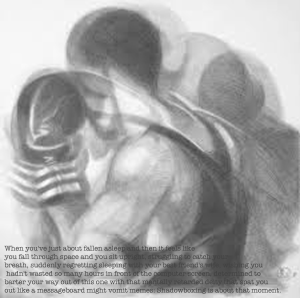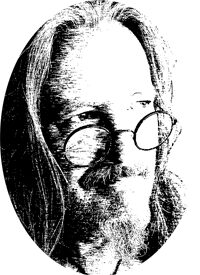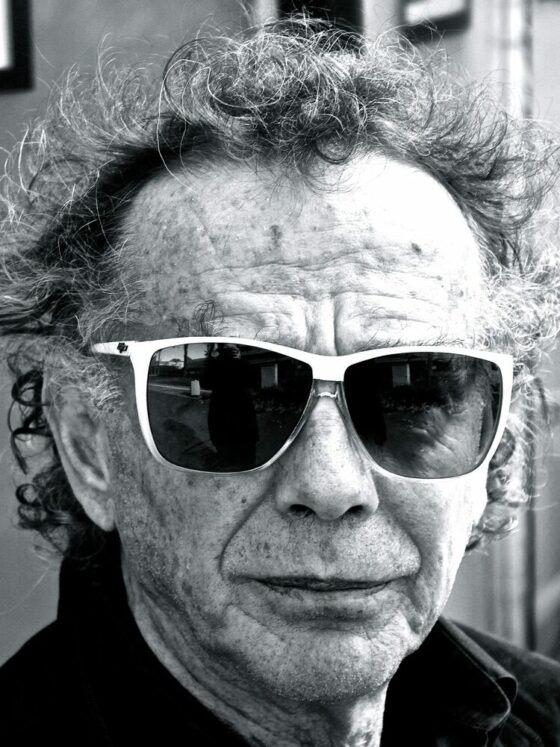My greatest fear, the feeling that haunts my gut-twisted nightmares, the panicked, whispered song my quickened blood mutters through a muddy, bleary-eyed bluster, is the fear of being small. I’m a big man, as far as men go, standing taller than most, built high with bones wrapped tight in lean, bloody meat. People who meet me in the street scan my frame, eyebrows arched, and tell me I should play basketball – as if, by virtue of stature, I could occupy that lofty position of “athlete.” These affirmations, the makings of this rarefied atmosphere I breathe, seem to have instilled in me a great preoccupation with the size of things.
At night, while I wait for sleep to claim me for what few restless hours I can muster, I build a universe in my head. It starts with a broad, timeless expanse of space painted across my mental canvas. A never-ending sea of utmost black. Then, with a brush of oneiric bristles bound up loosely in pale-brown twine, I breathe life into stars – stars that frame each other against the harsh void like freckles on God’s cheek. Between each star lives a distance of a billion billion miles. Between each star, a journey longer than the distance my father and grandfather could have traveled in their lives. And for each star, with my bristly brush, I paint a number of planets. Some planets have rings made of ice and dust, suspended like nimbuses in the space around some venerated galactic saint. Some planets are gas giants, bigger across than all my worst ideas, less dense than the sheets that cover me when I sleep. Some planets are blue and crawling with wildlife – elk and worms and men and women and hermit crabs that die when rendered homeless. On some of these planets, I imagine what one might call nations – clusters of people with the same language, each nation a mosaic of seemingly infinite parts – millions upon millions of humans like me crammed together to make room for our identities.
I fall a thousand miles in an instant. The bed disappears from under me. The floor disappears from under the bed, and so on, and I plummet through the space of my dreams, until I jolt upright, my spine crackling with the latent static of aborted slumber. This sensation, they say, is a hypnic jerk. A falling away during the first moments of sleep. They say we all endure this, that we all fall together. But anyone who falls so far so regularly knows that it is a lonely enterprise.
The jerk throws my heart into a panicked series of palpitations – it races into my throat, only to be swallowed and pushed down my stomach, crammed away, banished to the catacombs of my intestines. The terror swells like a muted symphony, like a roaring fire in a matchbox as big as the world. I gasp, I sputter, I make my peace with whatever blind idiot made me out of clay. I am positive that this is it – my last inglorious moment on Earth, my last seconds of consciousness consigned to fretting and madly wondering what the hell I accomplished during my spin of the wheel. And then I don’t die. My heart, after laboring so vigorously, returns to its normal resting rate. The gears in my mind cease their relentless grinding.
I return, after a time, to the idea of nations, of shared identity, of how a bucket of water is composed of millions of droplets, bonded together, less themselves than a part of the whole, a component of something more expansive. Then I think of myself, a droplet of water, a strong-jawed experiment in surface tension, and I think of how heavy weigh my manifold struggles – the cloying attentions of my mother, the troubling traces of my father that I glean routinely from my DNA, the silenced cries of my ravaged sister, the fatalism that permeates every thought of my blossoming brother and his dichotomous childhood. The devotion of my significant other, tempered by immense loss and the reaping of a selfish want that I can never fully explicate.
Then, that great horror, that insurmountable fear of ineffectuality, wraps its crooked fingers around my throat and stares deeply into the space between myself and the end of a braided rope. The horror reminds me that my troubles are not cataclysmic. My bad days are not unique in their ability to harrow, and my wounded pride bleeds the same indignity as everybody else’s. My sorrows grow in a garden of sorrow, are fertilized by the sorrow of others, and are reaped and basketed with the whole melancholy genus. Everybody awakens with a jerk and mourns their wasted lives in the stifled seconds of ante-death. In these moments, though, the fundamental disconnect, the static that shuts us away from each other, proves our isolation. It confronts us with our smallness.
I am a mote of dust amid seven billion other motes of dust, and between our hopes and our fears is enough pressure to swing the planet out of alignment. If every one of us, seven billion and one, stood on each other’s shoulders, we wouldn’t even make it a tenth of the way to Mars. This blight, this sense of perennial ruin washes over me in thick, sludgy waves. We cannot break free of gravity; we cannot achieve escape velocity. This is the sad truth of man. I lay down. I wrap myself in a sheet that is denser than the outer skin of Jupiter and I imagine myself floating in inky space, my darkened ken populated by prophecies of the hypnic jerk and the racing heart and the idea that the value of my life, when measured out, will stretch to my moderate height and no farther. While I float toward sleep, while I hope it comes soft and smooth, I paint planets with icy rings and constellations that spell the secret name of the universe.
—
© John Leo



